If you are looking for ways to make money blogging on WordPress, I assume you’d like to launch your own website.
You might wonder how long it will take to build a profitable website, can you make money on WordPress, and what are the best ways to monetize a WordPress site.
It’s scary and risky to step into the unknown world and launch a website if you haven’t done it before. I was in the same shoes a few years ago.
In 2021, I did not know how to monetize a website and grow it to a stable income source. I was afraid of spending my time and resources on something I had no clue about. I was questioning myself, “How do I monetize my website if I finally build one?” As a marketer, I have already helped different businesses establish their online presence. However, building your own thing is always more responsible and thrilling.
In two years, I built and grew my Medium blog to over 300,000 reads. Inspired by my modest success, I launched this website to share my marketing experiences with you, my dear reader.
In this article, I share how to launch and monetize a blog using WordPress. No fluff or fake promises. Instead, only proven strategies with numbers and my case studies for you to learn how to make money with WordPress.
1. Google AdSense
Over 90% of internet users are exposed to Google display ads or banner ads, according to Power Traffick.
Both B2B and B2C companies focus on Google Ads and social media advertisement to reach their target audience. Perhaps, this is why ad spending is expected to show an annual growth rate of 8.78% by 2025, according to Statista. What does this data mean? It shows an opportunity you, as a website owner, should not neglect.
Ads help website owners monetize their websites and get paid for their hard work. Three types of websites generate good ad revenue, according to Google:
- Blog pages
- Forum pages
- Free online tool sites
If you want to make money blogging on WordPress, you fall under the first category. You can advertise on your WordPress site, make WordPress ad revenue and show relevant advertisements for your users.
Google AdSense calculator shows how much approximately you can make if you monetize your website by running ads.
Let’s take my website as an example. According to Google Adsense, my website falls under the category “Work and Education” or “Business Industries.” If I had around 50,000 monthly visitors, here is how much I could make by monetizing my WordPress blog.
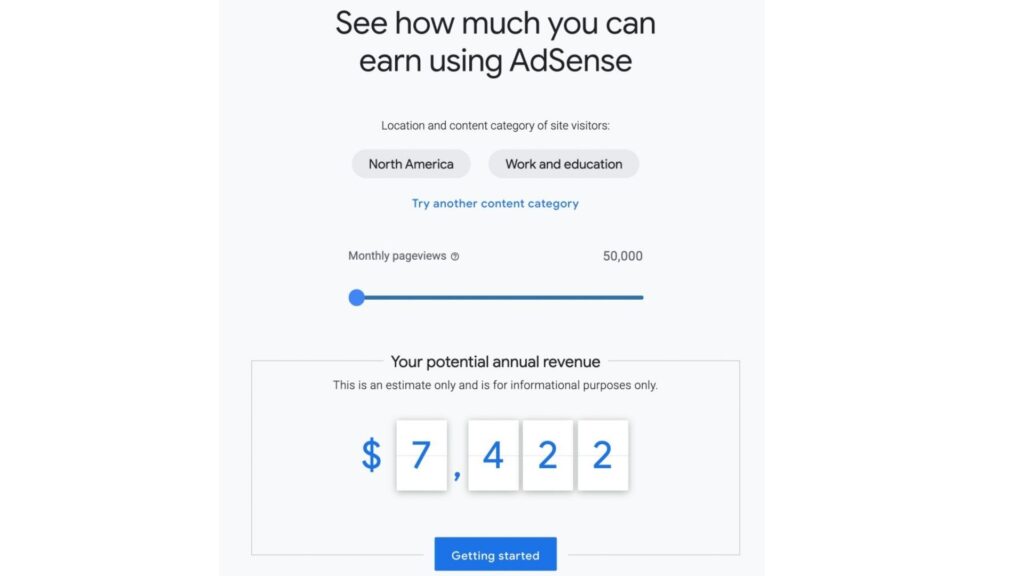
If you wonder how much you can get paid for blogging on WordPress, here are the most profitable niches in the USA in 2021, according to Semrush and Ahrefs studies. Google pays you for every ad click from your website and takes a small commission from every click.
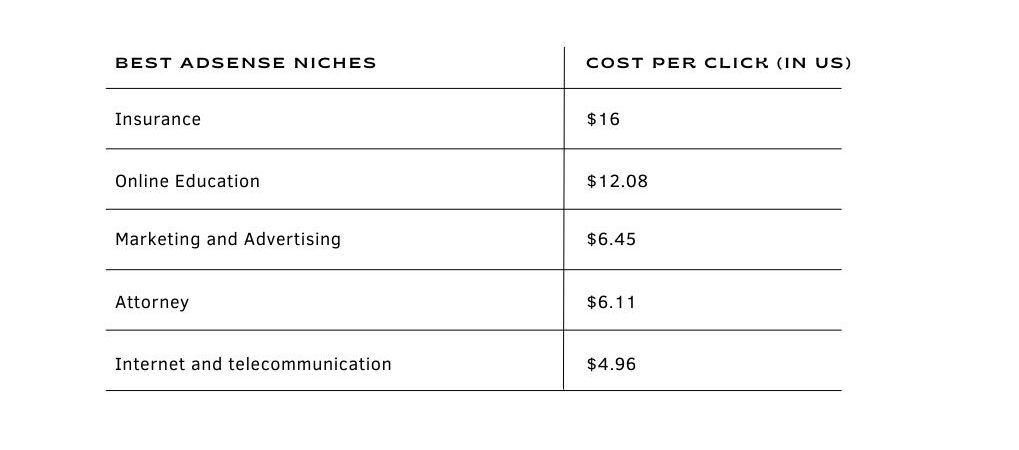
In short, the logic is the following: the more unique and narrow your website niche is, the higher will be your ad revenue.
How to use Google AdSense on WordPress
Can you use AdSense on WordPress and add ads in WordPress? Yes, you can advertise on WordPress!
Google provides a detailed guide on how to set up Google AdSense. In short, you’ll have to register on the Google AdSense platform, add a small piece of code to your website and wait for verification. It usually takes up to 24 hours (might take longer) if your website complies with the Google rules. You have to be older than 18 years old. Your website should be older than six months. No Google spam filter applied, no duplicate content, no black hat strategies used for traffic acquisition, no invalid clicks, no deceptive site navigation, etc.
Setting up a Google AdSense account is free! You don’t have to pay anything to monetize your WordPress website. Besides, you don’t have to create any advertisements yourself. Instead, Google will do it for you! Once you are enrolled in the program, your WordPress website will make you a steady passive income.
If your website has at least 1000 visitors per month, go ahead and join the program! Meanwhile, continue publishing high-quality content and promoting your website. It will help you improve its performance and increase WordPress ad revenue.
2. Paid guest posting
When I was a marketing specialist at a UX agency, I used to get three to five guest post requests every day!
My website was still a baby (just five months old) when I got two guest post requests.
On average, most bloggers write 1-5 guest posts every month, according to Semrush’s study.
Have you ever wondered why guest posting is so popular these days? Why would anyone spend time writing a unique content and sharing it with someone else instead of using it on his own?
As a marketer, I know that guest posting is a powerful strategy for reaching a new audience with your content, improving your website’s DA (domain authority) by getting valuable backlinks and making search engines trust you.
Guest posting is a time- and resource-consuming but proven-to-work link-building technique. Backlinks from reputable sources signal to Google that your website must be trustworthy. Moreover, the number of backlinks is one of the ranking factors that can help improve positions in search. It’s one of the reasons why website owners spend time negotiating and building backlinks.
If you wonder how to monetize your free WordPress blog, start asking for a guest posting fee.
As a website owner, you spend time, energy, and resources growing it. If someone wants to benefit from your website’s audience or DA (domain authority), let them pay for it.
I personally like the following pricing scale by No BS Marketplace. The pricing depends on DR (domain rate) that the Ahrefs marketing tool assigns to every existing website. If your website has at least 20 DR and some traffic, not necessarily 4k monthly visitors, you can already monetize your WordPress blog.
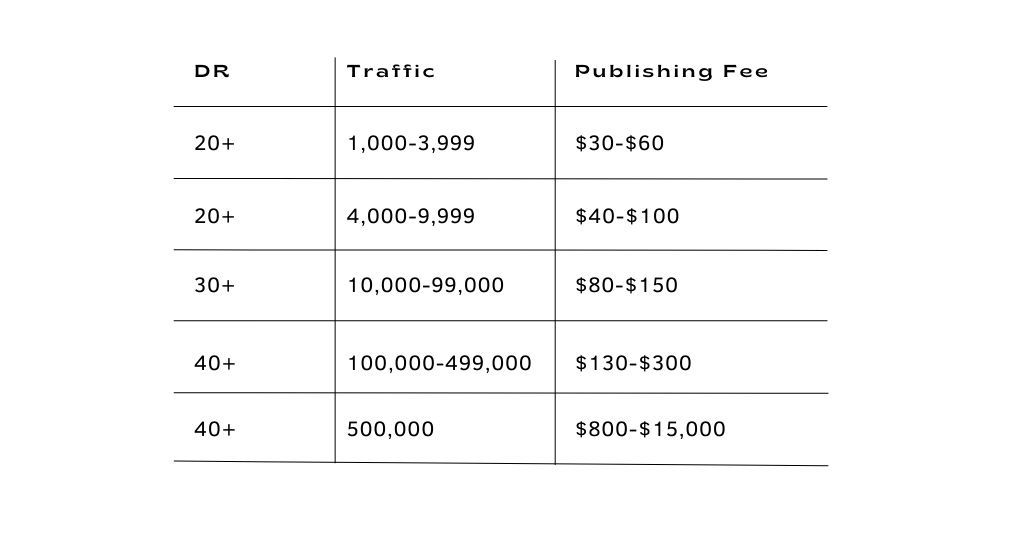
Paid guest posting is one of the methods I will use to make money blogging on WordPress.
It takes time and effort to grow a website and achieve decent results, but the output is worth it.
Accepting all guest post requests is luring, but you should know the risks. Too many external links and poor quality content might harm your website’s performance in search. Make sure you check the guest post’s originality, grammar, spelling, fact check, and tone of voice before publishing it on your website. Users feel too promotional content right away, which can harm your online reputation.
All in all, if you wonder how to earn money from a free WordPress blog, start monetizing your website via guest posting.
3. Affiliate marketing
Affiliate marketing is one of the best ways to monetize a website.
Roughly 80% of brands run affiliate programs you can enroll in and make money from, according to Mediakix. It’s not by accident.
Affiliate marketing requires little to no knowledge to get started. All you need is a website, many quality blog posts on a particular topic, and the target audience. In reality, a lot of work has to be done to make your content searchable and attract the target audience to your website. However, once your blog is set and alive, you can monetize it. How do you make money off a blog? It’s a simple income source that will generate revenue while you sleep.
One of my articles earned me over $3k as an affiliate commission on Medium overnight. However, I never expected this paycheck to come!
If you wonder how to get paid for blogging on WordPress, my answer for you is to start using affiliate marketing!
PartnerStack lists hundreds of affiliate programs you can join in a minute. All your stats and commissions will be stored in one place and easily withdrawn using PayPal or Stripe.
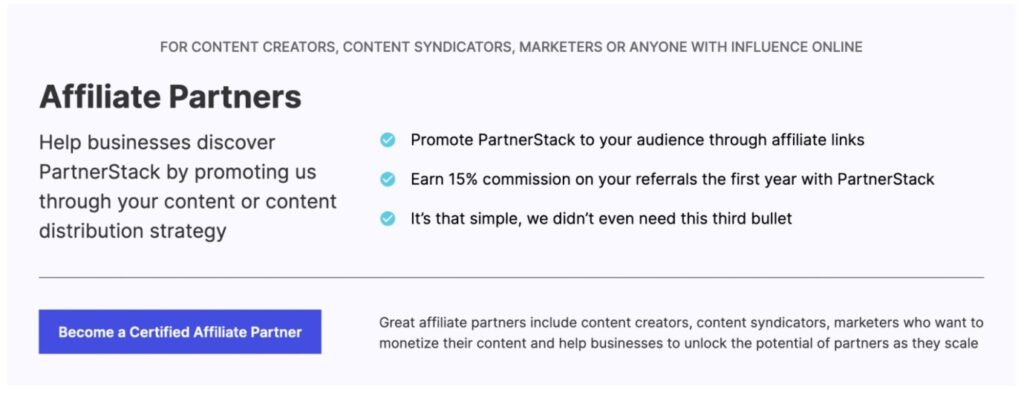
4. Sponsored listicles
It’s not the typical monetization technique everyone talks about. I’ve discovered sponsored listicles when I worked as a marketer at a UX agency.
The logic is the following. You create a listicle recommending the top products or services you tried and liked.
Once your content gets a steady traffic flow, more companies will start reaching out to you with their offers. They will want to feature their products or services in your content. Moreover, they will most likely want you to put their mentions as close to the top as possible. As the website owner, it’s up to you how much you will charge for the listing and the position.
Clutch, a B2B rating platform, charges from $150 to an astonishing $23,000 for a company listing in one of their directories. Guess what? Companies pay for it! They sponsor their positions to become more visible to their target audience. You can do a similar thing on your blog. Here is how.
One of my first blog posts was a listicle on low-cost and free online writing tools. I wrote an in-depth review of all tools I use daily as a content creator. Besides, I added affiliate links to the article. Now, my goal is the following — start ranking with this blog post on the first search results page for the keyword “online writing tools.”
I can reach out to other websites in the same industry and offer a placement or wait a bit more for collaboration requests to arrive in my inbox.
Whenever you create optimized content on the Internet, I want you to remember this essential rule:
Higher online visibility equals more opportunities.
Once your content attracts particular audiences, opportunities will find you. All you’ll have to do is accept the right ones and set reasonable pricing.
5. How to monetize a blog without ads
If you wonder how to make money off a blog without running ads, many proven ways exist to do so.
Although advertisement is one of the best ways to monetize a website, many site owners choose user experience over ads.
If you’ve ever read content on the Forbes website, you might have noticed how cluttered their pages are. The article occupies one-third of the page, while the rest is filled with video ads, banners, in-text ads, and pop-ups.
As a reader, I experience difficulties when everything moves and flashes in the sidebars. As a website owner, I don’t want to harm my website’s user experience to get a few more pennies for running ads. Can you monetize a WordPress blog without ads? Hell, yes!
If you look for ways how to monetize your blog without ads, you might find the following ideas helpful:
- Sell your services, such as consulting or writing.
- Sell educational products, such as ebooks, online courses, or checklists.
- Sell merchandise through your website or linked ecommerce store.
- Offer exclusive membership groups.
I am a big advocate of the first three ideas. Once you show your expertise and back it up with a positive impact, people will start reaching out to you with requests. Those with similar issues would be willing to hear your advice and solutions. It’s a perfect opportunity to sell consulting services.
If you aim to create a money-generation machine that will work without your involvement, try selling digital products.
Problem-solution ebooks, case studies, and checklists will help you earn money from your WordPress blog. At the same time, your audience will get valuable content to nail their current challenges.
If you want to go even further, you can use your digital products to upsell customers with more relevant products and services.
If you still wonder whether it’s worth launching and monetizing a blog using WordPress, my answer is yes! There are endless ways to get paid for blogging on WordPress. It only takes time, discipline, and dedication to unlock endless monetization opportunities and create life freedom!
What you should know before launching a blog on WordPress
Is WordPress free?
WordPress is free to use as a CMS or content management system. All you have to do is download and use it.
However, your final goal is to have a website up and running. In this case, you’ll have to add the costs of a domain name, web hosting, website theme (if you choose a paid one), and set-up costs. I paid over $200 to set up my WordPress blog with a simple website theme.
Is WordPress legit?
In short, yes! WordPress is the most popular content management system. WordPress accounts for over 62% of all websites that use CMS, according to Techjury. Over 455 million sites relied on WordPress for publishing in 2021, including TechCrunch, TED, CNN, and Spotify use WordPress.
Why is WordPress so popular? Many website owners love it for its simplicity. You don’t need to study manuals to understand WordPress functionality. Besides, you can publish a new page in seconds.
I run my website on WordPress and could not be happier. It allows me to share my experience and message with people worldwide and get paid for doing what I love.

Hello there!
My name is Victoria.
I am an SEO expert, Medium top writer, solopreneur, and the founder of Self Made Millennials. I help companies create optimized content and attract potential customers through organic search results. In addition, I share how content creators can monetize their writing skills.
Latest posts
Get my SEO writing ebook
Related blog posts
SEO writing How to Make Money From SEO In 2024 written by Victoria Kurichenkoupdated on October 16, 20221 in 3 Americans run a side hustle next to their full-time job, according to Zapier research, and the number of side hustlers is steadily growing! Someone works overtime because the main job …
Creator tools How to Make Money on Medium Website In 2024 written by Victoria Kurichenko updated on November 6, 2023 I’ve been writing on Medium since March 2020. When many writers struggled with low performance and eventually quit, I kept writing on Medium. I’ve grown my blog to 13,000+ subscribers …



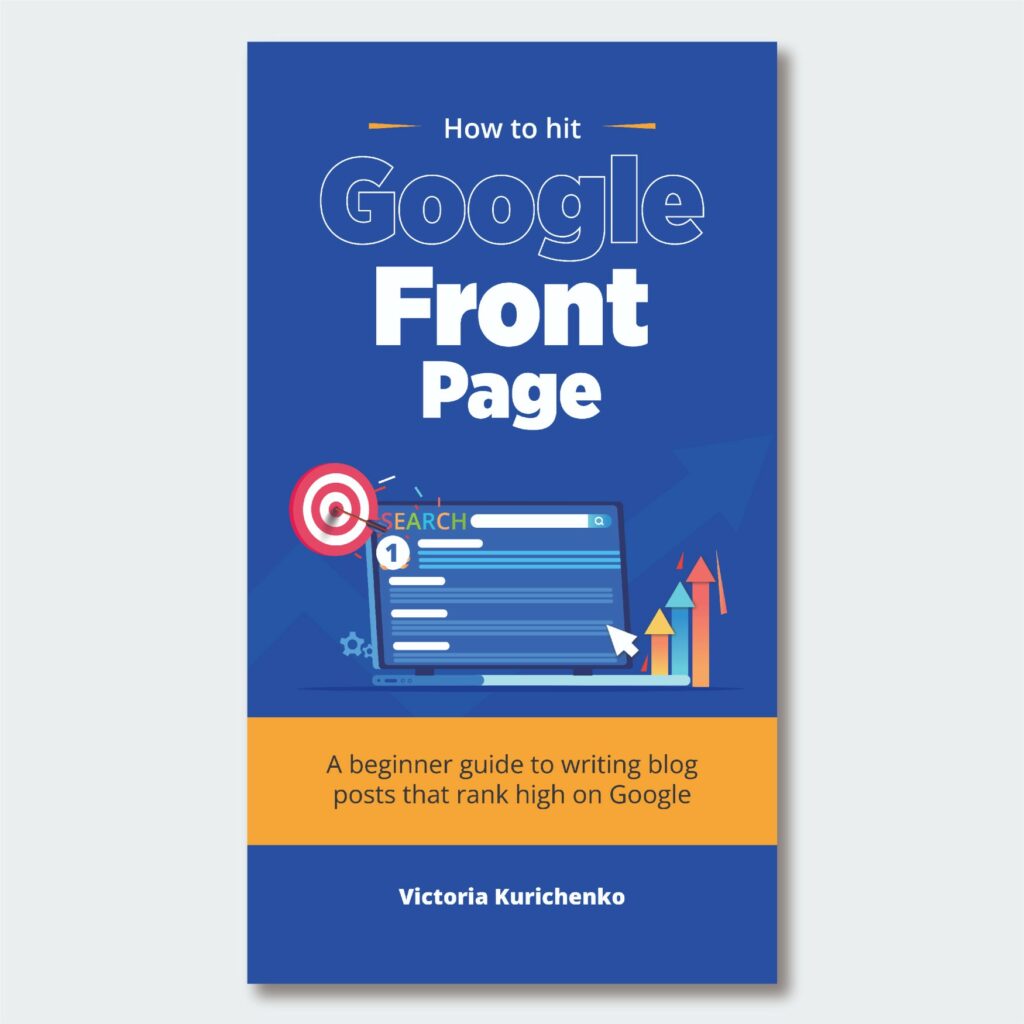

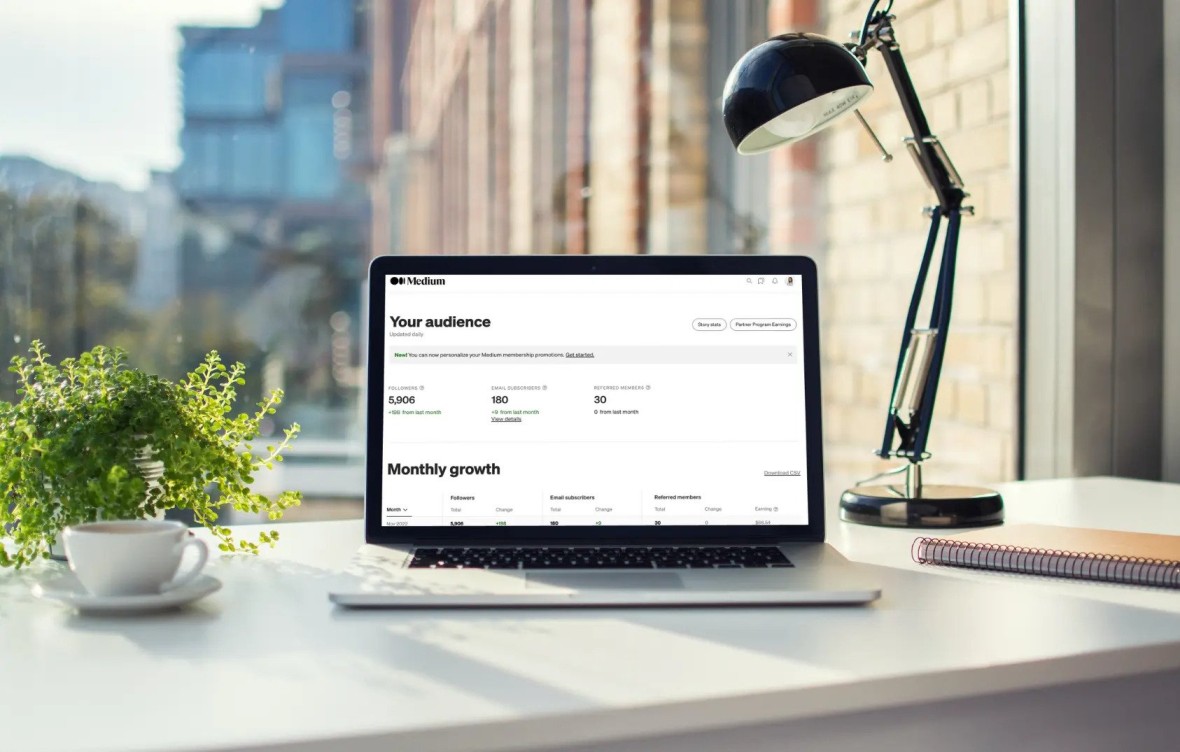
4 Responses
I have read your blog on how to monetize Your WordPress Website: Strategies for Generating Revenue.It was very interesting and helpful but I can add some extra points in your article. Here some extra points:
1.Place display ads.
2.Become an affiliate marketer.
3.Write sponsored blog posts.
4.Sell exclusive content.
5.Sell merchandise.
These are some extra points to add to your article.
One more way, a bit different and completely new: You can build an Alexa sounds skill (a very popular skill type) with the In Skill Purchase for buying additional sounds. Just with WordPress website and Convoworks plugin.
Disclosure, I am author of the Convoworks.
Great And easy-to-understand article Victoria. Big applaud to your efforts. It’s truly a significant manifestation of your expertise about what you’re saying. I learned so much from you reading your article. Keep the good work up. When you’re working seriously and honestly, it will definitely pay off.
More to success to you and your business.
Hi Karim,
Thank you so much for reading my article and I am delighted to hear it’s helpful. 🙂